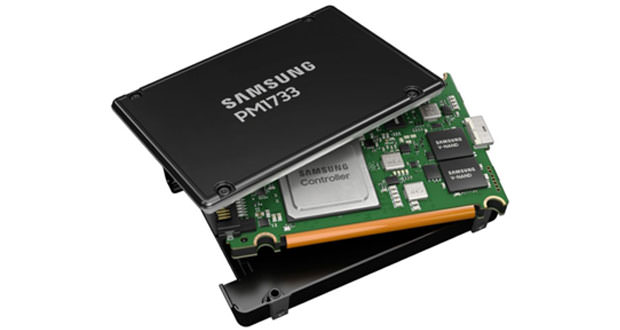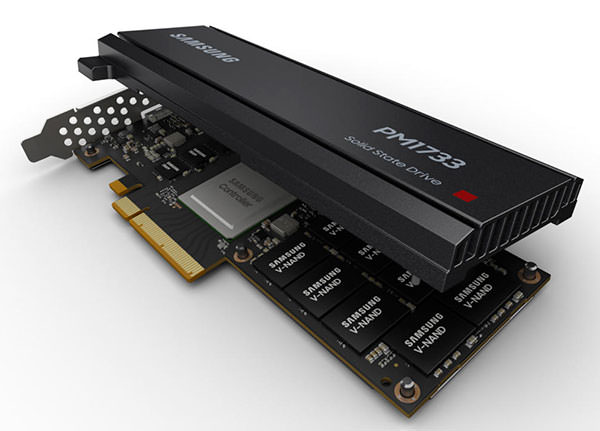Samsung SSD for datacenters designed to never stop
The Korean company innovates in the storage sector for professional environments with new high-capacity SSD, in which new features stand out for redundancy.
We all know the benefits of SSD or Solid-State Drive: those related to data-transfer speeds, much higher than those typical of hard disk solutions, combined with a reduction in access latency. The direct advantage given by their use is that of obtaining very high overall performance in every scenario of use, which justifies the higher cost per Gbyte compared to traditional hard drives.
The new models Samsung PM1733 and PM1735, are equipped with PCI Express 4.0 interface and for this reason, they reach very high data-transfer speeds: in the sequential reading up to 8.000MB / s in the versions on PCI Express card and 6,400MB/s for those with U.2 interface, data that match sequential write speeds of 3,800MB/s. In order to exploit this potential they must be used with compatible systems: currently only those based on second generation AMD EPYC CPUs are equipped with PCI Express 4.0 controllers.
Various versions are available, with capacities reaching 30.72TB for PM1733 solutions with U.2 interface but starting at 0.8TB for entry level models. Such a high maximum capacity is obviously justified, in terms of cost, by datacenter installation: it is certainly not a question of SSD destined for the consumer public.
More than the hardware component, the technologies implemented are of interest to these Samsung products. That FIP or fail-in-place ensures that the SSD should never stop operating, even in the presence of serious malfunctions at the level of the NAND memory chips. The SSD are not by their nature intended to operate forever, but suffer a natural process that leads to malfunction.
This is related to the number of average writings and readings that are made each day, over a period of time that is measured over several years. SSD manufacturers have always provided provisioning mechanisms, reserving part of the storage capacity as a true backup that intervenes to take the place of defective memory cells.
The FIP software implemented in these new models intervenes in real time in the event of a malfunction, activating algorithms that detect errors in the SSD at the chip level, preventing defective NAND components from compromising their correct functioning. It is easy to imagine that this technology operates on the basis of a certain amount of storage space that is left available by the system, precisely as a function of provisioning: Samsung does not provide specific indications, but it is easy to predict that a large amount of memory is dedicated to this real-time backup function.
In the absence of errors detected by the FIP software, the SSD automatically and without stop checks for any data corruption by re-positioning them in chips that are active. The complexity is remarkable: just think that in the 30.72TB version of capacity there are 512 NAND chips.
Stating that these SSD will last for sermpre is perhaps excessive, as the provisioning memory implemented sooner or later will end. The interesting aspect of FIP technology is that of automatically intervening in the event of problems, without interrupting the service, and above all offering an average duration of the SSD which on paper is higher than the standard.
Then the technological evolution of the next few years will make these products progressively obsolete, well before the memory cells are implemented to show the sign of age and continuous use over time.
Product prices and availability are subject to change. Any price and availablility information displayed on Amazon at the time of purchase will apply to the purchase of any products.


